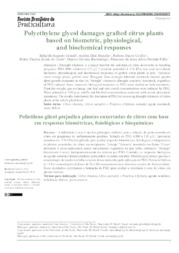Polyethylene glycol damages grafted citrus plants based on biometric, physiological, and biochemical responses.
Polyethylene glycol damages grafted citrus plants based on biometric, physiological, and biochemical responses.
Author(s): GIRARDI, E. A.; BRANDÃO, A. D.; COELHO, R. D.; COUTO, H. T. Z. do; BUCKERIDGE, M. S.; MOURÃO FILHO, F. de A. A.
Summary: Drought tolerance is a major trait for the selection of citrus rootstocks in breeding programs. PEG 4000 solution at 110 g L-1 (osmotic potential of -376 kPa) was used to evaluate biometric, physiological, and biochemical responses of grafted citrus plants in pots. ?Valencia? sweet orange plants grafted onto ?Rangpur? lime (drought tolerant) rootstock showed greater plant growth compared to that on ?Swingle? citrumelo (drought sensitive) rootstock, regardless of PEG-induced stress; however, biological responses to PEG were similar on both rootstocks. Plant dry weight, gas exchange, and leaf and root starch concentrations were reduced by PEG. Water potential at 2:00 p.m. and Fe and Mn leaf concentrations increased with severe phytotoxic symptoms. The results corroborate the limitation of PEG for assessing drought tolerance of citrus plants at the whole plant level.
Publication year: 2018
Types of publication: Journal article
Unit: Embrapa Cassava & Fruits
Keywords: Limão
Observation
Some of Embrapa's publications are published as ePub files. To read them, use or download one of the following free software options to your computer or mobile device. Android: Google Play Books; IOS: iBooks; Windows and Linux: Calibre.
Access other publications
Access the Agricultural Research Database (BDPA) to consult Embrapa's full library collection and records.
Visit Embrapa Bookstore to purchase books and other publications sold by Embrapa.

